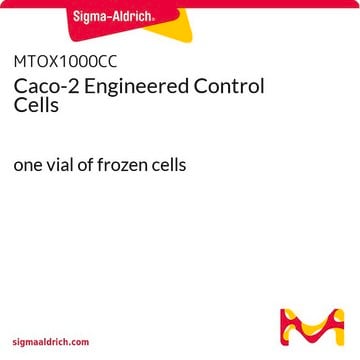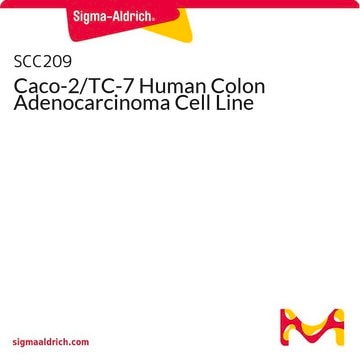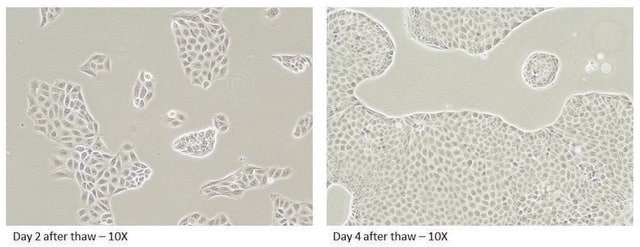MTOX1000CC24
Caco-2 Engineered Control Cells
Human male colorectal tissue, adenocarcinoma
About This Item
Productos recomendados
product name
Caco-2 Engineered Control Cells, one assay ready, 24-well plate
biological source
human male colorectal tissue (Source Disease: adenocarcinoma)
form
liquid
General description
The three week production lead time begins on the Monday following a purchase, in the third week the plates are shipped on Tuesday for receipt on Wednesday or Thursday. As a biologic product that is shipped at room temperature the cells must be processed immediately upon receipt.
A minimum of 4 assay ready plates is required to purchase. Please allow for 1 week after ordering, for the plates to be seeded. Plates will be shipped to the customer on day 16 of the 21-day culturing process.
Application
Transporter Function in Caco-2 Cells with Targeted P-Glycoprotein, MRP2 and BCRP Gene Knockout Using Zinc Finger Nucleases
Comparison of Function and Relative Transporter Protein Concentrations in Caco-2 Cells with Single and Double Knockouts of the ABCB1, ABCG2, and ABCC2 Genes
Caco-2 Transporter Knockout Cell Based Assays
Features and Benefits
- The 24-well Transwell format enables the these cells to be included in standard drug transporter protocols
- Human assay with no interference from animal inhibitors
- The 21-day cell culture period is reduced to 6-days for customers, saving valuable resources
Quality
Legal Information
related product
Storage Class
10 - Combustible liquids
wgk_germany
WGK 3
flash_point_f
Not applicable
flash_point_c
Not applicable
Elija entre una de las versiones más recientes:
Certificados de análisis (COA)
¿No ve la versión correcta?
Si necesita una versión concreta, puede buscar un certificado específico por el número de lote.
¿Ya tiene este producto?
Encuentre la documentación para los productos que ha comprado recientemente en la Biblioteca de documentos.
Artículos
We presents an article on The Role of Intestinal Efflux Transporters In Drug Absorption.
We presents an article on The Role of Intestinal Efflux Transporters In Drug Absorption.
We presents an article on The Role of Intestinal Efflux Transporters In Drug Absorption.
We presents an article on The Role of Intestinal Efflux Transporters In Drug Absorption.
Nuestro equipo de científicos tiene experiencia en todas las áreas de investigación: Ciencias de la vida, Ciencia de los materiales, Síntesis química, Cromatografía, Analítica y muchas otras.
Póngase en contacto con el Servicio técnico







